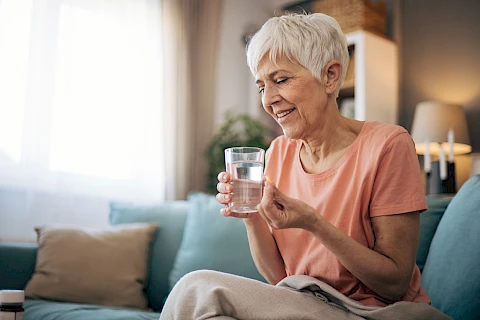
Managing hydration alongside incontinence can be challenging. However, staying hydrated is essential for bladder health and general well-being. This guide offers practical tips for maintaining hydration while minimizing discomfort.
Senior Incontinence
Incontinence is a common issue among seniors. It involves the involuntary loss of bladder control, which can disrupt daily life. Dehydration can exacerbate bladder problems by leading to concentrated urine, which can irritate the bladder and increase the urgency to urinate. Reducing fluid intake may seem tempting but can increase the risk of urinary tract infections and other health complications. Understanding these risks is the first step in managing both hydration and incontinence effectively.
Establishing a Hydration Routine
You need to establish a routine that ensures consistent hydration. Seniors should aim to drink water frequently throughout the day. This helps maintain steady hydration without overwhelming the bladder. It's wise to avoid drinking large amounts of fluids right before bedtime to minimize nighttime trips to the bathroom.
Choosing the Right Beverages
Water should always be the primary source of hydration, as it's the best for overall health. Herbal teas are also a good option, as they are hydrating and generally caffeine-free. Caffeinated and sugary drinks, like coffee and sodas, should be limited. These beverages can irritate the bladder, increasing incontinence symptoms.
Monitoring Fluid Intake
Keeping track of how much fluid is consumed can be helpful. Using apps or journals makes tracking easier. It's also useful to watch for signs of dehydration, such as dry mouth, fatigue, or dark urine. Staying informed will help ensure proper hydration without contributing to incontinence issues.
Practical Tips for Managing Incontinence
With a few helpful tips, you can help a senior loved one manage incontinence. Here are a few:
- Planning Bathroom Breaks: Scheduling regular bathroom breaks throughout the day can help manage incontinence. It creates predictability and reduces the chances of unexpected accidents. Establishing a routine makes it easier to manage both hydration and bladder health.
- Wearing Appropriate Incontinence Products: The right incontinence products can make a significant difference. There are various options available, including pads and specialized underwear that provide protection and comfort. These products help maintain peace of mind while staying hydrated and active.
- Consulting Healthcare Professionals for Personalized Advice: Every individual's needs are different. Consulting a healthcare professional can provide personalized advice on managing hydration and incontinence. They can offer specific tips and might recommend treatments that can help improve bladder control.
Balancing Hydration and Comfort
Seniors can stay hydrated while managing incontinence by making small but impactful adjustments. Practicing mindful hydration habits, such as spreading out water intake and enjoying hydrating foods, can support bladder health without discomfort. Maintaining hydration is a key part of overall health, benefiting everything from skin to energy levels. With these manageable strategies, seniors can feel confident in their ability to stay hydrated while remaining comfortable.
Do you or a loved one need help managing these concerns? Senior Helpers Greensburg proudly serves the communities of Greensburg, Jeanette, Irwin/North Huntingdon, and Mt Pleasant. Contact us today for support tailored to your needs.